
Postgraduate colloquium advocates STEM
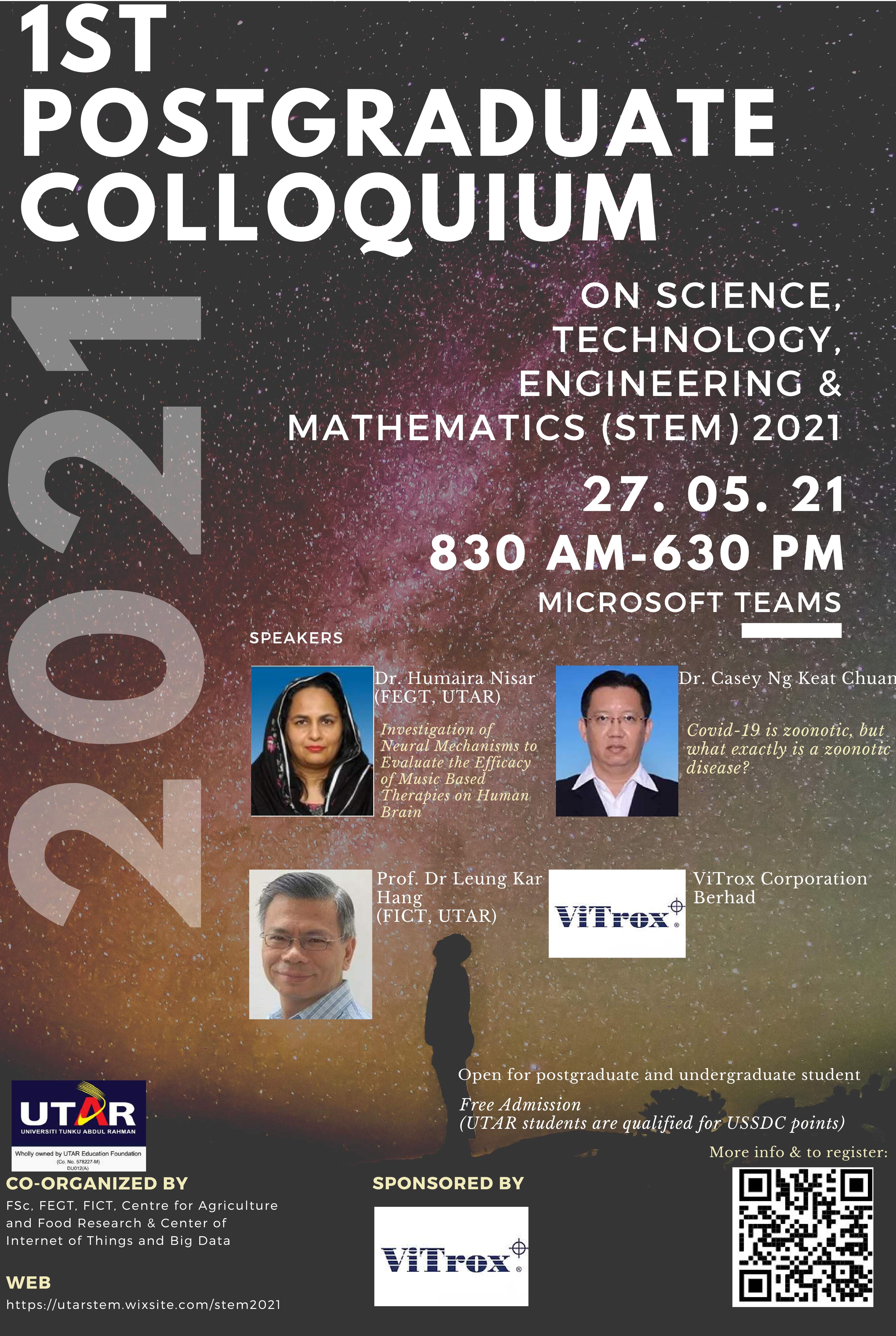
Official poster of the digital research colloquium
The importance of research in science and technology for advancing innovation and technology to improve the quality of human lives was well emphasised in the “1st Postgraduate Colloquium on Science, Technology, Engineering and Mathematics (STEM) 2021”. The event was jointly organised by the Faculty of Science (FSc), Faculty of Engineering and Green Technology (FEGT), Faculty of Information and Communication Technology (FICT), Centre for Agriculture and Food Research (CAFR), and Centre for Internet of Things and Big Data (CIoTBD) on 27 May 2021 via Microsoft Teams. It was sponsored by ViTrox.
Themed ‘Towards Innovative Research in Science, Technology, Engineering and Mathematics (STEM)’, the colloquium served as an academic platform for researchers to present their research findings in all aspects of STEM to encourage substantive knowledge transfer. It also took into awareness the vital knowledge provided by science, engineering and technology in the advancement of the human race. UTAR undergraduate students who participated also benefitted from the colloquium as they acquired a better understanding of UTAR postgraduate programmes, with the hope they will be inspired to be part of the community of future scientists that will drive the advancement of science.
Dr Liew (second box from left) emphasising the importance of research in science and technology in his speech
Officiating the digital colloquium was FICT Dean Assoc Prof Ts Dr Liew Soung Yue. “This is a meaningful research event, and I believe this is also the first colloquium conducted digitally in UTAR due to the pandemic. It is also in this pandemic that we, human, have been striving to survive and obtain a brighter and better future while attempting to this new norm. The driving force behind this is actually the innovation from STEM, therefore, today’s colloquium also encourages cross-disciplinary research to solve human problems, which are in line with Sustainable Development Goals (SDGs) defined by the United Nations (UN). Therefore, your participation here today has given you the opportunity to share and learn about the latest research findings and for you to explore other research, as well as to expand collaborative network with other faculties,” said Dr Liew.
Dr Ng (second box from left) introducing his research
The highlights of the event were the research presentation by three esteemed keynote speakers. The first keynote speaker, Dr Casey Ng Keat Chuan, spoke about his research titled “Zoonotic Diseases: From the Zoological Perspectives”. Participants learnt as he provided answers to the infection mechanism of zoonotic diseases, Covid-19, and the importance of Malaysia in zoonotic disease studies.
In relating his research to the current pandemic, the associate member of CAFR also explained that Covid-19 is clearly zoological in origin, along with other perilous diseases like Ebola, AIDS, and SARS, and dengue is known to be hosted by native primates in the jungles of Malaysia. “However, very little investigation is globally focused on the zoological aspect of the diseases. The immediate issue at stake is, until the viromes, physiological and behavioural traits of wildlife hosts are clarified, our ability to unravel the mysteries of zoonotic diseases will be restrained,” said Dr Ng.
Further into this presentation, he elucidated on some species-level perspectives and identified areas that postgraduate studies can further contribute to the scientific conversation of zoonotic diseases. His suggestions for further studies in zoonotic diseases included identifying species with ACE2 receptor, finding reasons for numerous species of bats appearing in various phylogeny branches of vertebrates, and lastly, identifying the implication of saliva-sharing between hosts and intermediate hosts in labs, farms and markets.
Dr Humaira (centre box) explaining neurofeedback training
The second keynote speaker, Head of Master of Engineering (Electronic Systems) Programme Assoc Prof Ts Dr Humaira Nisar from FEGT, enlightened participants on “An Investigation of Neural Mechanisms to Evaluate the Efficacy of Music-based Therapies on Human Brain: Effect of Neurofeedback Training on Response Conflict”.
“This study explores the NFT effects towards response-conflict resolution phenomenon. Neurofeedback training (NFT) teaches self-control of brain activity to the subjects by measuring brain waves and providing a feedback signal in real-time. NFT is considered to be a promising tool for healthy people to enhance cognition, however, its specific effects on response-conflict are unknown. Changes in Absolute power and functional connectivity in different bands of response-conflict EEG were investigated. The EEG of each participant was recorded while performing a response-conflict task before and after NFT. The results show an increase in theta and alpha band powers and functional connectivity. No training specific modulation is observed in beta band functional connectivity. A significant improvement in theta and alpha band functional connectivity is observed in the NFT group that is not present in the control group. These findings provide a strong rationale for the use of NFT in the resolution of response-conflict phenomenon in healthy human beings,” explained Dr Humaira.
She added, “In the current study, we used non-invasive NFT on healthy participants. With the help of EEG recordings and employing TF analysis methods, we investigated evidence of NFT-related differences in normal healthy participants. The participants showed improvements in the processing speed of the response conflict tasks, as indicated by significant faster RT in the NFT group. We also found that alpha power in response-conflict tasks indicated training-related difference at frontal sites. Also, theta power shows NFT-related changes at anterior-frontal, occipital, and temporal sites. Theta and alpha band phase synchronisation between the frontal and parietal areas of the brain enhanced significantly in the NFT group. This impact was not found in the control group. Hence, these findings suggest that EEG neurofeedback training is a positive cognition enhancement procedure for healthy adults.”
Dr Leung (second box from right) introducing his research
The third and final keynote speaker was FICT academic Prof Dr Leung Kar Hang, who presented on “Video Surveillance Systems”. His presentation aimed to give a general overview of video surveillance systems. The materials are mainly extracted from a review paper by Elharrouss, Almaadeed, and Al-Maadeed, with 179 references in the year 2021. The paper gives relevant information about the field with respect to usage, components, techniques and future development direction.
He spoke about video surveillance system and its application and further elucidated on passive and active video surveillance. “Passive video surveillance means the system only records the scene and one only needs a hardware component, whereas the active surveillance system can enhance the system by adding human observers to intervene crimes or mishaps. The system itself can conduct intelligent detection, interpretation, understanding, recording, and create alarms based on analysis,” explained Prof Leung. He also listed a few developments that can be produced from the usage of video surveillance systems, which include face detection and recognition, action detection and recognition, crowd counting, person re-identification, object detection and tracking, video summarization, and abnormal event detection.
Dr Lim (centre box) encouraging participants to continue their efforts in research
Marking an end to the colloquium was the closing speech by FSc Dean Assoc Prof Dr Lim Tuck Meng, who thanked all the participants for attending the event. “If this pandemic happened 20 years ago, it would not be possible because of the limitations of the internet and technology infrastructure back then. We would also have to rely on printed materials. However, today, we can enjoy this event online and materials are available in soft copies for everyone. Although we are facing a pandemic, our passion for research and the accumulation of knowledge allows us to move forward and achieve our goals and studies. Different ages of researchers will have their own set of challenges to face, but whatever the challenges presented, I hope you will continue working towards your goals,” enthused Dr Lim.
The colloquium was also comprised of four separate tracks which saw various presenters presenting on topics. Click to view their abstract. The “Best Presenter” award from each track was later awarded. The winners each received RM50 cash prize.
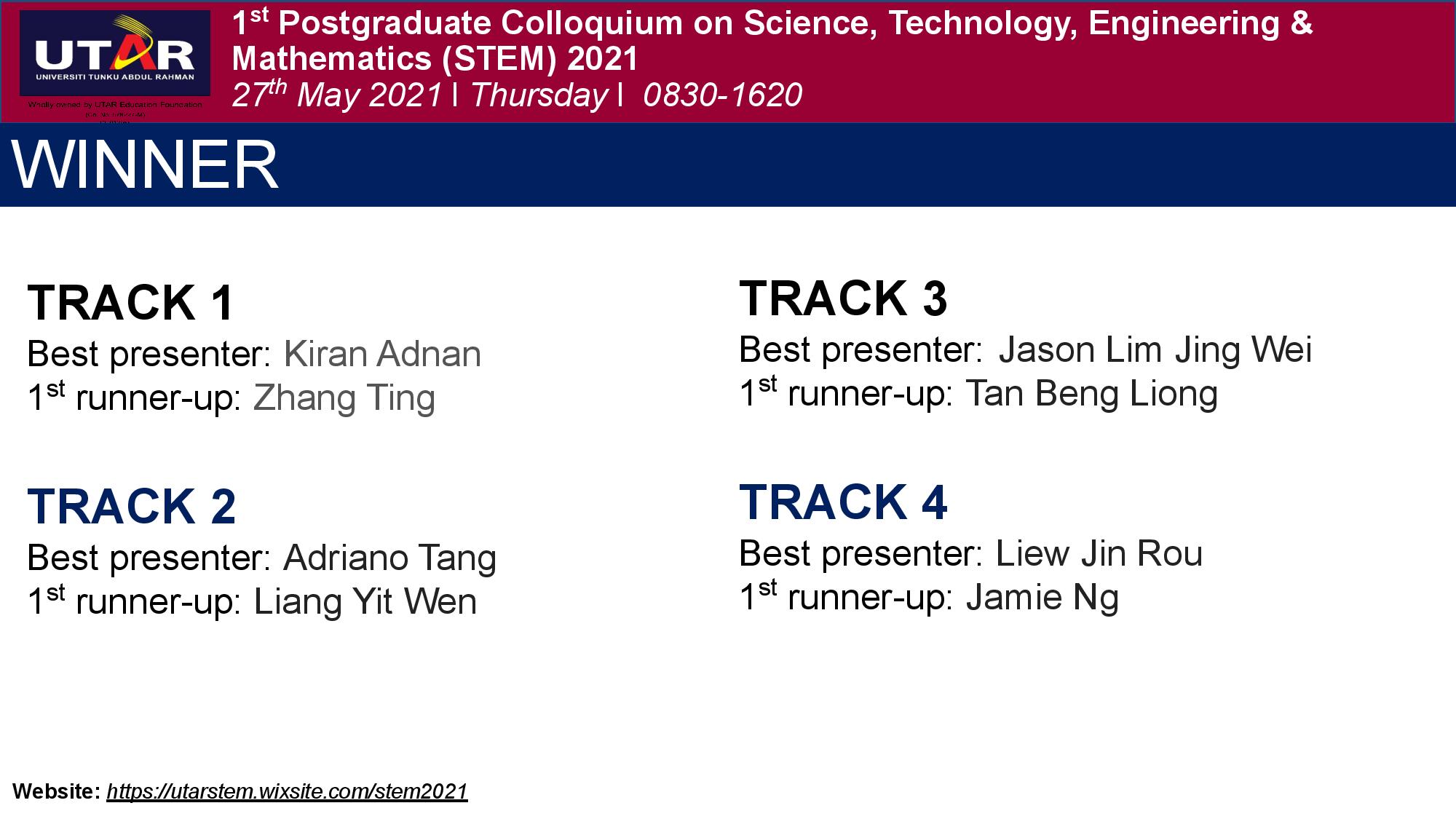
The best presenters from each track
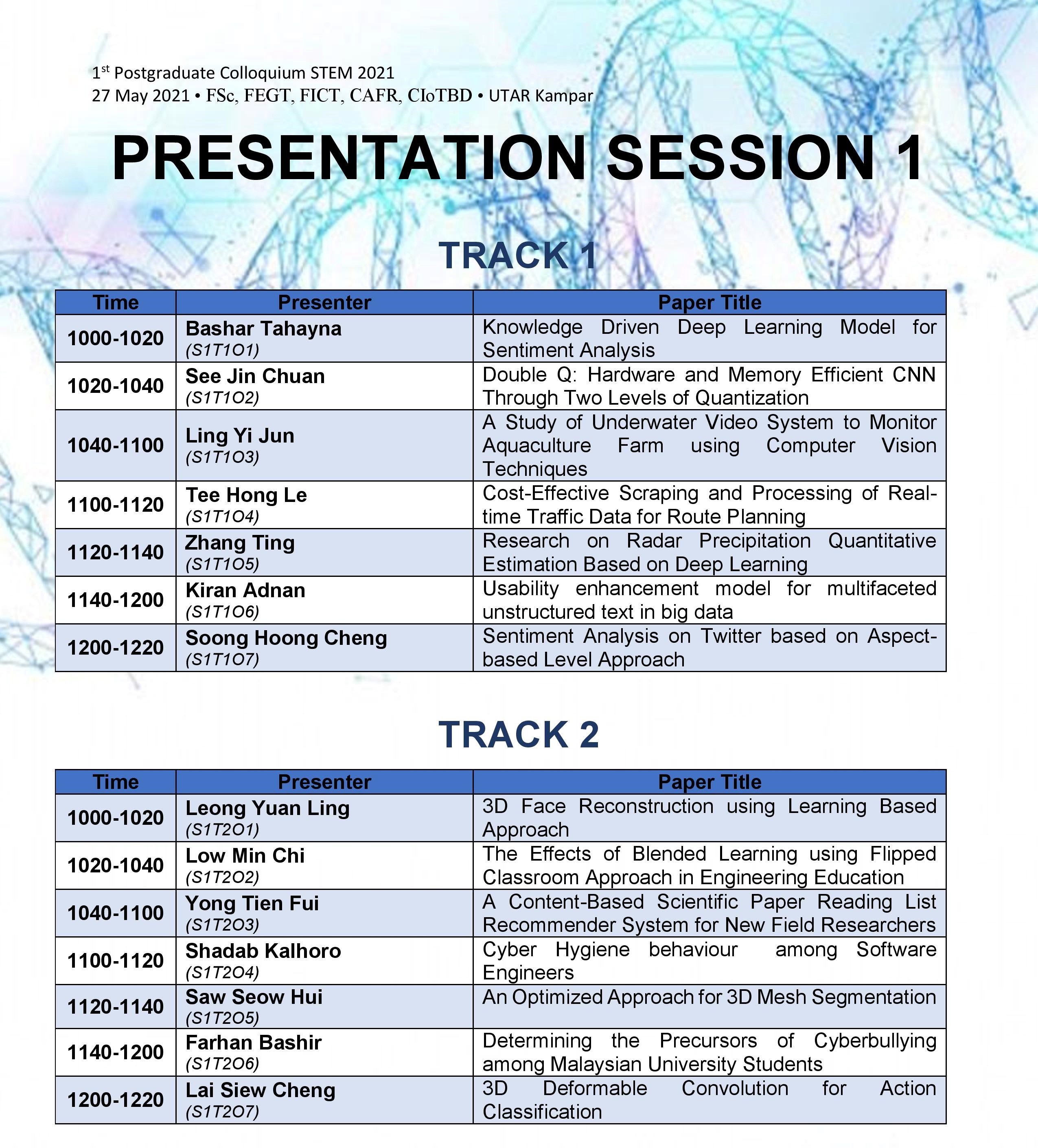
Presenters and their topics in each track
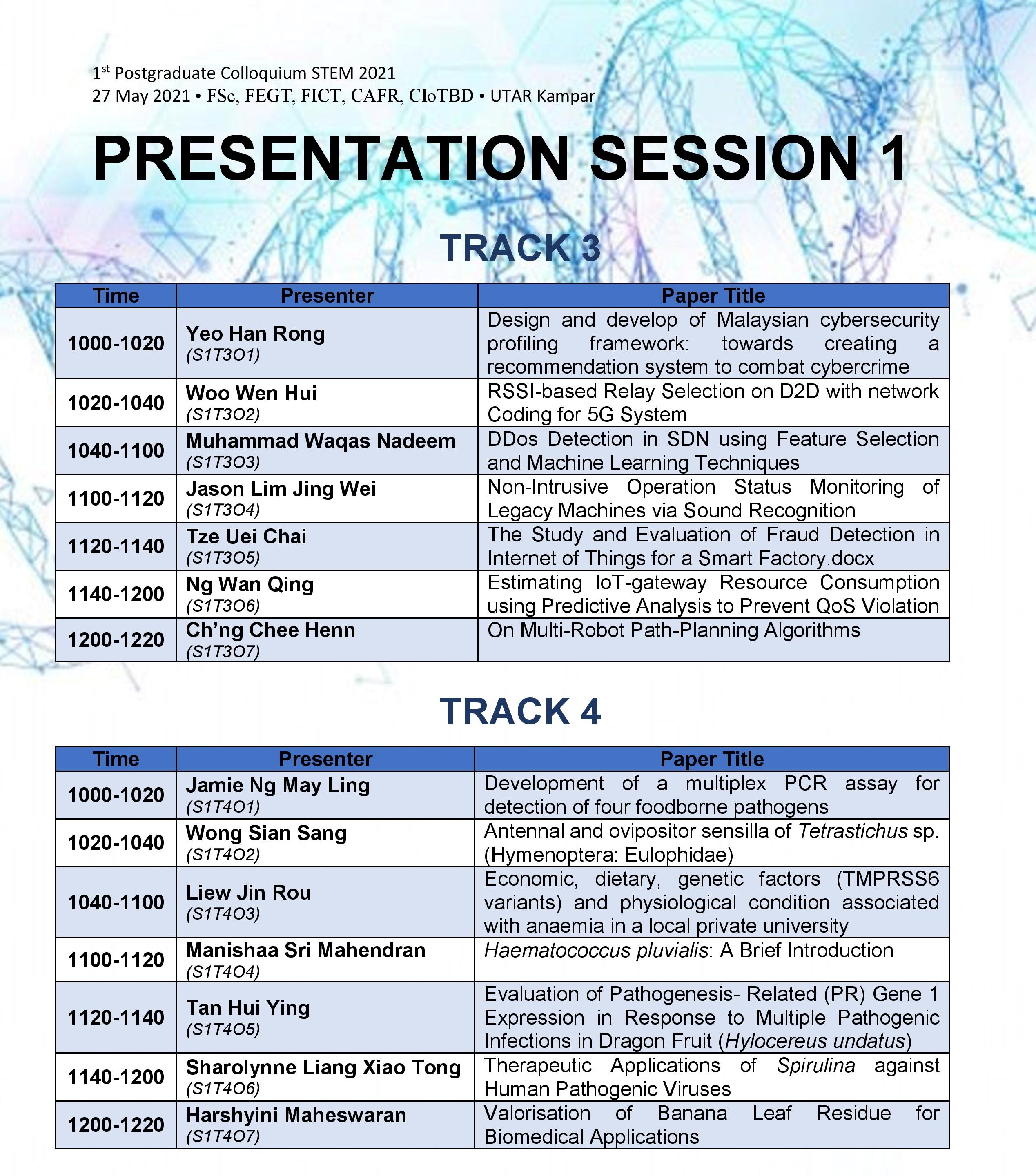
Presenters and their topics in each track
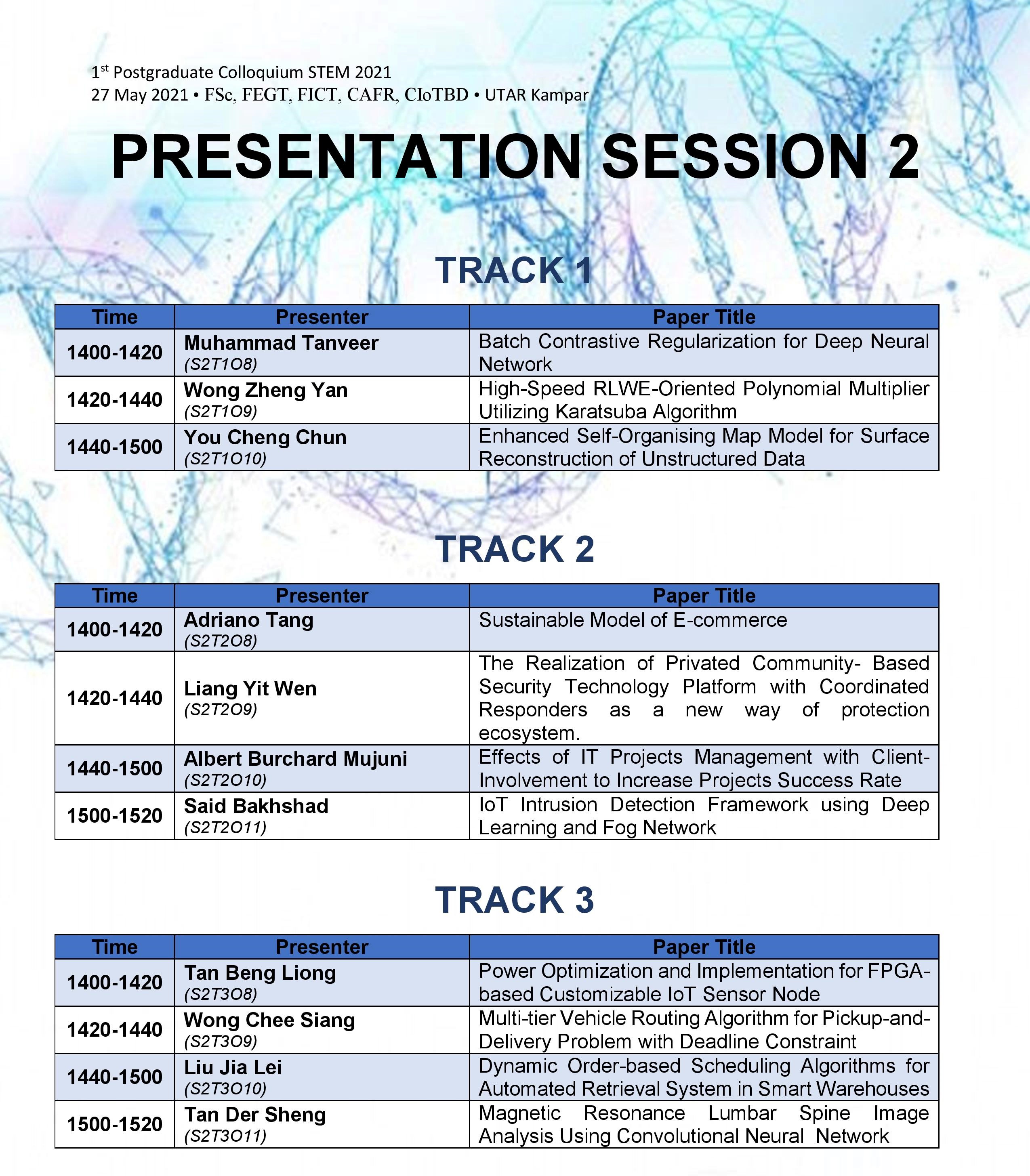
Presenters and their topics in each track
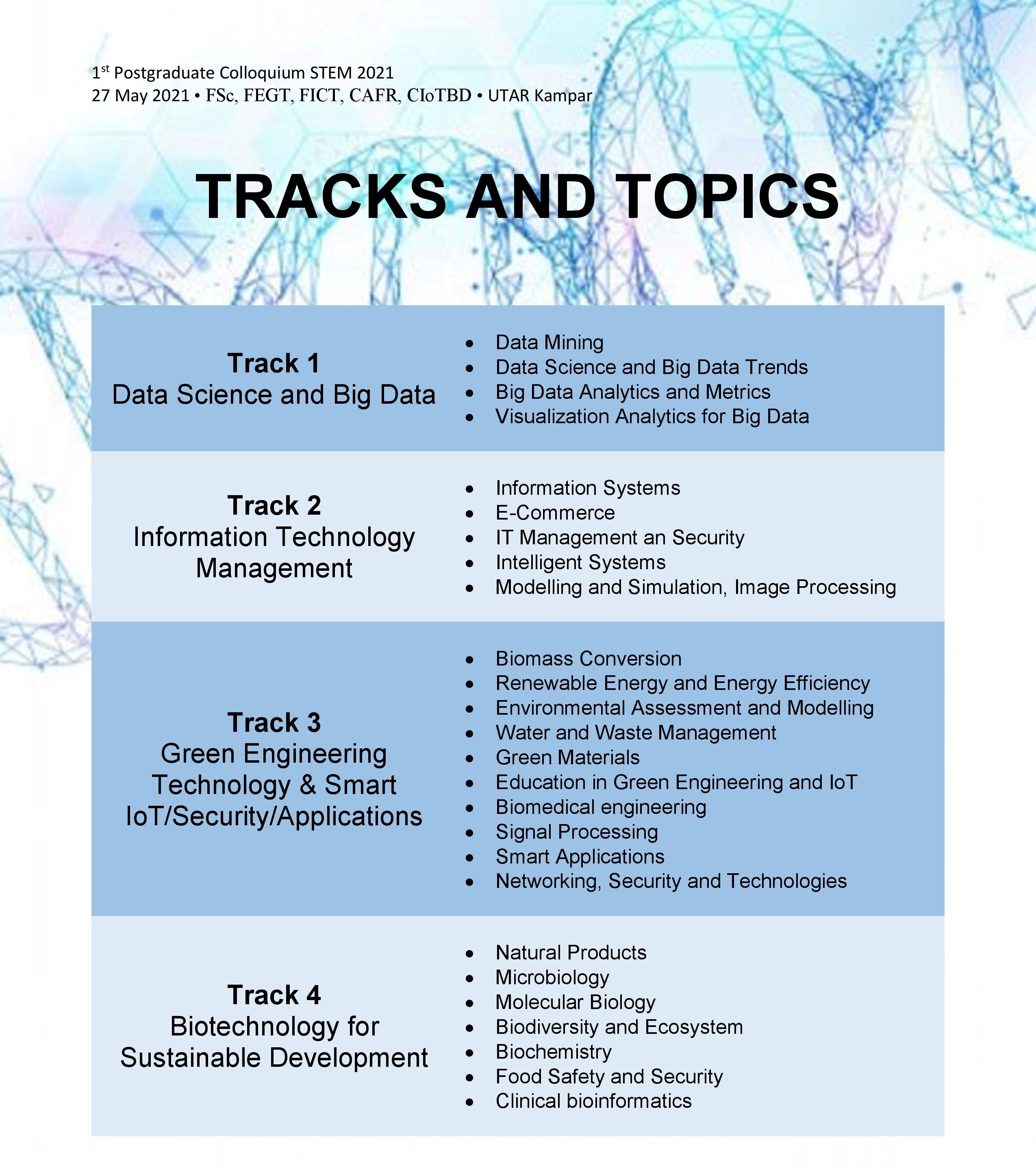
Topics discussed in each track
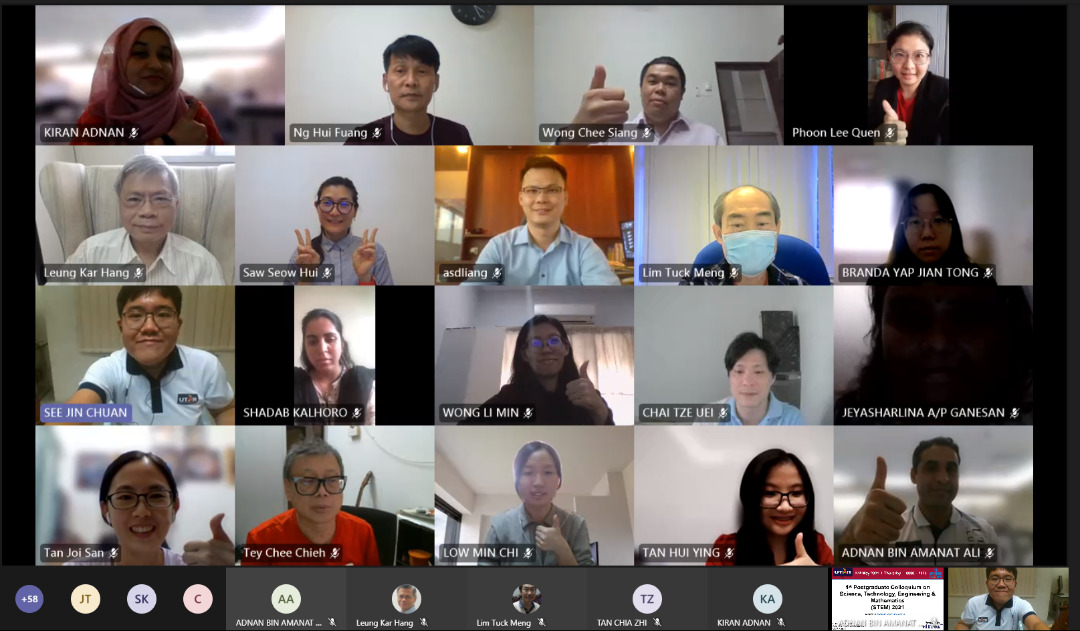
Some of the participants and speakers during the digital research colloquium
![]()
© 2021 UNIVERSITI TUNKU ABDUL RAHMAN DU012(A).
Wholly owned by UTAR Education Foundation (200201010564(578227-M)) LEGAL STATEMENT TERM OF USAGE PRIVACY NOTICE